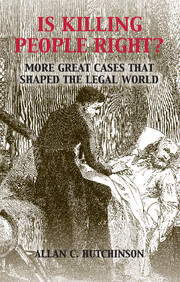Book contents
- Frontmatter
- Dedication
- Contents
- List of figures
- Preface
- 1 Introduction: on the road (again)
- 2 Is killing people right?: law and the end of life
- 3 Oil on troubled waters: the consequences of civil liability
- 4 The politics of law: cats, pigeons and old chestnuts
- 5 The companies we keep: the moralities of business
- 6 Fifty shades of Brown: consent and the criminal law
- 7 Putting up a defence: sex, murder and videotapes
- 8 Wade-ing into controversy: a case of accidental activism
- 9 Playing a different tune: fairness in deal making
- 10 Conclusion: surfing the tides
- Sources
- Index
- References
1 - Introduction: on the road (again)
Published online by Cambridge University Press: 05 May 2016
- Frontmatter
- Dedication
- Contents
- List of figures
- Preface
- 1 Introduction: on the road (again)
- 2 Is killing people right?: law and the end of life
- 3 Oil on troubled waters: the consequences of civil liability
- 4 The politics of law: cats, pigeons and old chestnuts
- 5 The companies we keep: the moralities of business
- 6 Fifty shades of Brown: consent and the criminal law
- 7 Putting up a defence: sex, murder and videotapes
- 8 Wade-ing into controversy: a case of accidental activism
- 9 Playing a different tune: fairness in deal making
- 10 Conclusion: surfing the tides
- Sources
- Index
- References
Summary
That the common law is a work in progress seems beyond serious dispute. Its history is a tale of judicial innovation in the name of a better fit between law and social justice. Always travelling but never arriving, the common law is in the never-ending process of change. Any honest assessment of the common law's history, therefore, cannot fail to acknowledge that law changes over time. As such, change can be recognised as one of the few indisputable and constant facts of both life and law. As the great and Celtic Robbie Burns put it, ‘Look abroad through nature's range. / Nature's mighty law is change’.
Yet, when it comes to the common law, a formidable challenge is to explain the dynamics of that change. In a world in which the common law has a relatively privileged place in channelling political power and regulating people's lives, it has to be asked and answered whether the common law is merely changing or making progress. Indeed, much of the common law's legitimacy and prestige is seen to rest upon the fact that it is not merely changing, but that it is actually improving upon itself. Once understood as a continuing work in progress, the pressing conundrum for lawyers and legal commentators becomes how to explain the tension between the need for both stability and change in the common law – what method, if any, can judges rely upon to negotiate the pushes and pulls of tradition and transformation? And to do so in a way that makes law into a better, not worse, mode of social discipline or organisation?
Despite robust disputes over the appropriate balance of these forces, there seems to exist a shared commitment to the idea that there is some elusive but enduring means or method by which to locate a workable proportion between stability and change. It is largely recognized that the past does and should matter, but there is widespread disagreement over why and how it matters – how is it possible to balance stability and continuity against flexibility and change such that it results in a state of affairs that is neither only a case of stunted development nor a case of ‘anything goes’?
- Type
- Chapter
- Information
- Is Killing People Right?More Great Cases that Shaped the Legal World, pp. 1 - 9Publisher: Cambridge University PressPrint publication year: 2016



